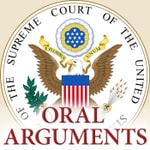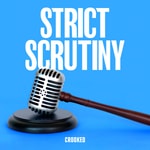Supreme Court Oral Arguments – Details, episodes & analysis
Podcast details
Technical and general information from the podcast's RSS feed.

Supreme Court Oral Arguments
scotusstats.com
Frequency: 1 episode/6d. Total Eps: 431

* Podcast adds new arguments automatically and immediately after they become available on supremecourt.gov
* Detailed episode descriptions with facts about the case from oyez.org and links to docket and other information.
* Convenient chapters to skip to any exchange between a justice and an advocate (available as soon as oyez.org publishes the transcript).
Also available in video form at https://www.youtube.com/@SCOTUSOralArgument
Recent rankings
Latest chart positions across Apple Podcasts and Spotify rankings.
Apple Podcasts
🇨🇦 Canada - government
27/07/2025#37🇺🇸 USA - government
27/07/2025#46🇺🇸 USA - government
26/07/2025#69🇺🇸 USA - government
25/07/2025#72🇺🇸 USA - government
23/07/2025#94🇺🇸 USA - government
22/07/2025#63🇺🇸 USA - government
21/07/2025#82🇺🇸 USA - government
20/07/2025#86🇺🇸 USA - government
19/07/2025#79🇺🇸 USA - government
18/07/2025#55
Spotify
No recent rankings available
Shared links between episodes and podcasts
Links found in episode descriptions and other podcasts that share them.
See allRSS feed quality and score
Technical evaluation of the podcast's RSS feed quality and structure.
See allScore global : 58%
Publication history
Monthly episode publishing history over the past years.
[23-191] Williams v. Washington
Season 2024
lundi 7 octobre 2024 • Duration 01:15:50
Williams v. Washington
Wikipedia · Justia · Docket · oyez.org
Argued on Oct 7, 2024.
Petitioner: Nancy Williams, et al.
Respondent: Fitzgerald Washington, Alabama Secretary of Labor.
Advocates:
- Adam G. Unikowsky (for the Petitioners)
- Edmund G. LaCour, Jr. (for the Respondent)
Facts of the case (from oyez.org)
Dissatisfied with the Alabama Department of Labor’s handling of their unemployment benefits applications, 26 plaintiffs filed a complaint and motion for injunctive relief against Secretary Fitzgerald Washington and the Department. The plaintiffs, each having filed applications for benefits, alleged various grievances against the Department’s processing methods. Subsequently, Secretary Washington and the Department filed a motion to dismiss the complaint. In response, the plaintiffs amended their complaint, which resulted in the omission of several initial claims and the exclusion of the Department as a defendant.
The remaining allegations in the suit were federal claims under 42 U.S.C. § 1983, accusing Secretary Washington of implementing policies and procedures that violated both the Social Security Act of 1935, 42 U.S.C. § 503(a)(1), and the Due Process Clause of the Fourteenth Amendment. The plaintiffs sought various forms of relief, including multiple permanent and preliminary injunctions to expedite the handling of unemployment compensation applications and improve communication clarity, as well as attorney fees. Secretary Washington again moved to dismiss the case, citing reasons such as lack of subject-matter jurisdiction, absence of a private cause of action, and the substantive meritlessness of the claims. The court granted the dismissal without stating the basis for it. The plaintiffs moved to alter, amend, or vacate the judgment, but the court denied their motion. They then appealed to the Alabama Supreme Court, which affirmed the dismissal, concluding that the lower court lacked jurisdiction over the suit because the plaintiffs had not yet exhausted mandatory administrative remedies.
Question
Does a Section 1983 claim brought in state court require the plaintiffs to first exhaust state administrative remedies?
[23-677] Royal Canin U.S.A. v. Wullschleger
Season 2024
lundi 7 octobre 2024 • Duration 01:05:21
Royal Canin U.S.A. v. Wullschleger
Argued on Oct 7, 2024.
Petitioner: Royal Canin U.S.A., Inc.
Respondent: Anastasia Wullschleger.
Advocates:
- Katherine B. Wellington (for the Petitioners)
- Ashley C. Keller (for the Respondents)
Facts of the case (from oyez.org)
Anastasia Wullschleger filed a class-action complaint in Missouri state court against Royal Canin and Nestle Purina, alleging that their requirement for a prescription for specialized dog food was misleading and led to higher prices. The defendants removed the case to federal court, which remanded it back to state court, and then they appealed to the U.S. Court of Appeals for the Eighth Circuit, which determined that the antitrust and unjust-enrichment claims raised substantial federal issues and belonged in federal court. Upon returning to the district court, Wullschleger amended her complaint to remove references to federal law, dropped the antitrust and unjust-enrichment claims, and added a civil-conspiracy claim. Despite these changes, the district court exercised federal-question jurisdiction and ultimately granted the manufacturers’ motion to dismiss, leading to a second appeal. Reviewing the case de novo, the Eighth Circuit concluded that amending a complaint to eliminate the only federal questions destroys subject-matter jurisdiction and thus returned the case to state court.
Question
Can a plaintiff whose state-court lawsuit has been removed by the defendants to federal court seek to have the case sent back to state court by amending the complaint to omit all references to federal law?
[23-108] Snyder v. United States
Season 2023
lundi 15 avril 2024 • Duration 01:38:38
Snyder v. United States
Argued on Apr 15, 2024.
Petitioner: James E. Snyder.
Respondent: United States of America.
Advocates:
- Lisa S. Blatt (for the Petitioner)
- Colleen E. Roh Sinzdak (for the Respondent)
Facts of the case (from oyez.org)
James Snyder formerly served as mayor of Portage, Indiana. He was convicted of federal funds bribery in violation of 18 U.S.C. § 666(a)(1)(B) for soliciting and accepting $13,000 in connection with the city’s purchases of garbage trucks, among other federal crimes.
Before, during, and after trial, Snyder argued that the evidence did not support a finding that there was an agreement to exchange money for the truck contracts before they were awarded. Without a prior quid pro quo agreement, he argued, § 666 cannot apply. Interpreting the plain language of the statute and Sixth Circuit precedent, the district court rejected his interpretation of that provision. The U.S. Court of Appeals for the Sixth Circuit affirmed.
Question
Does 18 U.S.C. § 666(a)(1)(B) criminalize gratuities, i.e., payments in recognition of actions a state or local official has already taken or committed to take, without any quid pro quo agreement to take those actions?
[21-1270] MOAC Mall Holdings LLC v. Transform Holdco LLC
Season 2022
lundi 5 décembre 2022 • Duration 01:09:51
MOAC Mall Holdings LLC v. Transform Holdco LLC
Justia (with opinion) · Docket · oyez.org
Argued on Dec 5, 2022.
Decided on Apr 19, 2023.
Petitioner: MOAC Mall Holdings LLC.
Respondent: Transform Holdco LLC.
Advocates:
- Douglas Hallward-Driemeier (for the Petitioner)
- Colleen E. Roh Sinzdak (for the United States, as amicus curiae, supporting the Petitioner)
- G. Eric Brunstad, Jr. (for the Respondents)
Facts of the case (from oyez.org)
Sears formerly occupied a space in the Mall of America in Minneapolis, Minnesota, under a lease with MOAC. In 2019, the bankruptcy court permitted Transform to assign the Sears lease to its wholly-owned subsidiary. MOAC moved to stay assignment of the lease, but the bankruptcy court denied the motion. MOAC appealed to federal district court but did so without first obtaining from the district court a stay of the assignment pending resolution of the appeal. Transform challenged the district court’s review of the bankruptcy court’s assignment order, claiming that Bankruptcy Code Section 363(m) “creates a rule of statutory mootness” barring appellate review of a sale “made to a good-faith purchaser” and not stayed pending appeal. Because MOAC had not obtained a stay, the district court dismissed as moot MOAC’s appeal. The U.S. Court of Appeals for the Second Circuit affirmed.
Question
Does Bankruptcy Code Section 363(m) limit the jurisdiction of appellate courts over an order approving the sale of a debtor’s assets or instead simply limit the remedies available on appeal from such an order?
Conclusion
Section 363(m) of the Bankruptcy Code—which restricts the effects of certain successful appeals of judicially authorized sales or leases of bankruptcy-estate property—is not a jurisdictional provision. Justice Ketanji Brown Jackson authored the unanimous opinion of the Court.
Congressional statutes often contain restrictions and conditions on relief, but absent a “clear statement” that a provision is jurisdictional, courts must not treat these restrictions and conditions as jurisdictional. Jurisdictional provisions limit the power of the district court, whereas other limitations bear on the rights or obligations of the parties.
Nothing in the limiting language of § 363(m)’s purports to “gover[n] a court’s adjudicatory capacity.” First, the text does not address a court’s authority or refer to the jurisdiction of district courts. Second, the structure of the Code and context of § 363(m) suggest it is not jurisdictional. The provision is separate from other provisions in the code that address federal courts’ jurisdiction over bankruptcy matters, and unlike other provisions, § 363(m) contains no “clear tie” to the jurisdictional provisions.
[21-1164] Wilkins v. United States
Season 2022
mercredi 30 novembre 2022 • Duration 01:05:47
Wilkins v. United States
Justia (with opinion) · Docket · oyez.org
Argued on Nov 30, 2022.
Decided on Mar 28, 2023.
Petitioner: Larry Steven Wilkins, et al..
Respondent: United States.
Advocates:
- Jeffrey W. McCoy (for the Petitioners)
- Benjamin W. Snyder (for the Respondent)
Facts of the case (from oyez.org)
Robbins Gulch Road runs between Highway 93 and the Bitterroot National Forest, crossing the private properties of Larry Wilkins and Jane Stanton near Connor, Montana. The previous owners of each of their properties had granted the United States an easement for Robbins Gulch Road in 1962.
In 2018, Wilkins and Stanton sued the United States under the Quiet Title Act (QTA) to confirm that the easement does not permit public use of the road and to enforce the government’s obligations to patrol and maintain the road against unrestricted public use. The district court granted the federal government’s motion to dismiss for lack of subject-matter jurisdiction, and the U.S. Court of Appeals for the Ninth Circuit affirmed.
Question
Is the Quiet Title Act’s statute of limitations a jurisdictional requirement or a claim-processing rule?
Conclusion
The Quiet Title Act’s 12-year statute of limitations is a claim-processing rule, not a jurisdictional requirement. Justice Sonia Sotomayor authored the 6-3 majority opinion of the Court holding that Wilkins's and Stanton's lawsuit may proceed.
Jurisdictional rules tend to disrupt litigation, whereas procedural rules (including claim-processing rules) seek to facilitate the litigation process. Given the risk of disruption and waste that accompanies the jurisdictional label, courts will view a procedural requirement as jurisdictional only if Congress “clearly states” that it is. As a general rule, most statutes of limitations are nonjurisdictional.
The 12-year statute of limitations described in 28 U.S.C. § 2409a(g) lacks a jurisdictional clear statement, and nothing in its text or context supports departing from the general rule that statutes of limitations are nonjurisdictional. Nor do any of the three cases the government cites definitively interpreted Section 2409a(g) as jurisdictional. Thus, the provision at issue is a claim-processing rule, not a jurisdictional one.
Justice Clarence Thomas dissented, arguing that the Court has long treated conditions on waivers of sovereign immunity, such as the one at issue in this case, as jurisdictional, and he would recognize the Court’s precedents as resolving the question.
[22-58] United States v. Texas
Season 2022
mardi 29 novembre 2022 • Duration 02:16:13
United States v. Texas
Wikipedia · Justia (with opinion) · Docket · oyez.org
Argued on Nov 29, 2022.
Decided on Jun 23, 2023.
Petitioner: United States of America, et al..
Respondent: State of Texas and State of Louisiana.
Advocates:
- Elizabeth B. Prelogar (for the Petitioners)
- Judd E. Stone, II (for the Respondents)
Facts of the case (from oyez.org)
In September 2021, the Secretary of Homeland Security issued the Guidelines for the Enforcement of Civil Immigration Law in an effort to allocate limited resources that could not feasibly deport every removable non-citizen presently in the United States. Texas and Louisiana challenged the Guidelines in federal court. The court concluded Texas had Article III standing to challenge the Guidelines because, as a result of the Guidelines, Texas would have to spend more money on law enforcement and social services. The court further concluded that the Guidelines violate the Administrative Procedure Act because they granted DHS discretion to decide who will be detained and when, and because they were issued without notice and comment. The court vacated the Guidelines nationwide, and the U.S. Court of Appeals for the Fifth Circuit denied a stay pending appeal.
Question
1. Do the state plaintiffs have Article III standing to challenge the Department of Homeland Security’s Guidelines for the Enforcement of Civil Immigration Law?
2. Do the Guidelines violate the Administrative Procedure Act?
3. Does 8 U.S.C. § 1252(f)(1) prevent the entry of an order to “hold unlawful and set aside” the guidelines under 5 U.S.C. § 706(2)?
Conclusion
Texas and Louisiana lack Article III standing to challenge immigration-enforcement guidelines promulgated by the Secretary of Homeland Security that prioritize the arrest and removal of certain noncitizens from the United States. Justice Brett Kavanaugh authored the majority opinion of the Court.
For a plaintiff to establish standing, they must show that they have suffered a real, specific injury that was caused by the defendant and that the court can remedy. While the district court had concluded that the states would suffer an injury in the form of additional costs due to the arrest policy in question, the Supreme Court pointed out that the injury also has to be "legally and judicially cognizable"—in other words, that it should be a type of dispute that courts have traditionally been involved in resolving. The states failed to point to any precedent or historical practice that supported their claim to have standing in this particular issue.
Second, the Court acknowledged that there are good reasons for federal courts to avoid these types of lawsuits, one of which is the Executive Branch’s discretion in deciding whom to arrest or prosecute, which falls under its constitutional Article II powers. Additionally, the courts generally lack the standards to judge the appropriateness of such enforcement decisions, which can be influenced by various factors like resource constraints and public safety needs. This conclusion does not mean that federal courts can never handle cases involving the Executive Branch's decisions about arrests or prosecutions. Indeed, certain circumstances might warrant a different standing analysis; for instance, if there are claims of selective prosecution based on discrimination, or if Congress has explicitly made certain injuries legally recognizable.
Justice Neil Gorsuch authored an opinion concurring in the judgment, in which Justices Clarence Thomas and Amy Coney Barrett joined, arguing that the states lack standing not because of the “cognizable injury” aspect of standing, but because of the redressability requirement.
Justice Barrett authored an opinion concurring in the judgment, in which Justice Gorsuch joined, also arguing that the case should be resolved on redressability grounds.
Justice Samuel Alito authored a dissenting opinion, arguing that Texas does have standing.
[21-1158] Percoco v. United States
Season 2022
lundi 28 novembre 2022 • Duration 01:07:55
Percoco v. United States
Justia (with opinion) · Docket · oyez.org
Argued on Nov 28, 2022.
Decided on May 11, 2023.
Petitioner: Joseph Percoco.
Respondent: United States.
Advocates:
- Jacob M. Roth (for the Petitioner)
- Nicole F. Reaves (for the Respondent)
Facts of the case (from oyez.org)
In 2012, New York Governor Andrew Cuomo launched an initiative, known as the “Buffalo Billion” initiative, to develop the greater Buffalo area. Alain Kaloyeros strategically secured a highly influential role in the initiative and used that role to award contracts to certain developers of his choosing based on his knowledge and control over the process. Once the scheme came to light, the participants were charged and convicted of conspiracy to engage in wire fraud. In 2018, a jury returned a verdict of guilty on all counts, and the defendants were sentenced to prison terms of varying lengths.
On appeal, the U.S. Court of Appeals for the Second Circuit affirmed the wire fraud convictions, relying on a “right-to-control theory” of wire fraud that allows for conviction on “a showing that the defendant, through the withholding or inaccurate reporting of information that could impact on economic decisions, deprived some person or entity of potentially valuable economic information.”
Question
Can a private citizen who has informal political or other influence over governmental decisionmaking owe a fiduciary duty to the general public such that he can be convicted of honest-services fraud?
Conclusion
A private citizen who has informal political or other influence over governmental decisionmaking can be convicted of honest-services fraud, but in this case, the jury instructions leading to Percoco’s conviction were insufficiently definite. Justice Samuel Alito authored the majority opinion of the Court.
The jury instruction in this case required the jury to determine whether Percoco had a “special relationship” with the government and had “dominated and controlled” government business. However, these concepts are too vague to allow ordinary people to understand what conduct is prohibited.
Justice Neil Gorsuch authored an opinion concurring in the judgment, in which Justice Clarence Thomas joined. Justice Gorsuch agreed with the majority but expressed concern over the vagueness of “honest-services fraud” more generally, regardless of what jury instruction might be provided.
[21-1170] Ciminelli v. United States
Season 2022
lundi 28 novembre 2022 • Duration 01:17:45
Ciminelli v. United States
Justia (with opinion) · Docket · oyez.org
Argued on Nov 28, 2022.
Decided on May 11, 2023.
Petitioner: Louis Ciminelli.
Respondent: United States.
Advocates:
- Michael R. Dreeben (for the Petitioner)
- Eric J. Feigin (for the Respondent)
Facts of the case (from oyez.org)
In 2012, New York Governor Andrew Cuomo launched an initiative, known as the “Buffalo Billion” initiative, to develop the greater Buffalo area. Alain Kaloyeros strategically secured a highly influential role in the initiative and used that role to award contracts to certain developers of his choosing based on his knowledge and control over the process. Once the scheme came to light, the participants were charged and convicted of conspiracy to engage in wire fraud. In 2018, a jury returned a verdict of guilty on all counts, and the defendants were sentenced to prison terms of varying lengths.
On appeal, the U.S. Court of Appeals for the Second Circuit affirmed the wire fraud convictions, relying on a “right-to-control theory” of wire fraud that allows for conviction on “a showing that the defendant, through the withholding or inaccurate reporting of information that could impact on economic decisions, deprived some person or entity of potentially valuable economic information.”
Question
Does the Second Circuit’s “right to control” theory of fraud state a valid basis for liability under the federal wire fraud statute?
Conclusion
The Second Circuit’s right-to-control theory cannot form the basis for a conviction under the federal fraud statutes because the right to control is not grounded in a traditional property interest. Justice Clarence Thomas authored the unanimous opinion of the Court.
The federal wire fraud statute prohibits the use of interstate wires for “any scheme or orifice to defraud, or for obtaining money or property by means of false or fraudulent pretenses, representations, or promises.” When the statute was enacted, the common understanding of the verb “to defraud” related to property rights. Although lower courts have interpreted the statute to include interests unconnected to traditional property rights, the Supreme Court in McNally v. United States, 483 U.S. 350 (1987), held that the statutes protect only individual property rights. The right-to-control theory has no roots in a traditional property interest and thus cannot be the basis for a conviction under the federal fraud statutes.
[21-376] Haaland v. Brackeen
Season 2022
mercredi 9 novembre 2022 • Duration 03:12:20
Haaland v. Brackeen
Wikipedia · Justia · Docket · oyez.org
Argued on Nov 9, 2022.
Petitioner: Deb Haaland, Secretary of the Interior, et al..
Respondent: Chat Everet Brackeen.
Advocates:
- Matthew D. McGill (for Chad Everet Brackeen, et al.)
- Judd E. Stone, II (for Texas)
- Edwin S. Kneedler (for the federal parties)
- Ian H. Gershengorn (for the tribal parties)
Facts of the case (from oyez.org)
The Indian Child Welfare Act (ICWA), a federal law enacted in 1978, restricts the removal of Native American children from their families and establishes a preference that Native children who are removed from their families be placed with extended family members or Native foster homes.
Several individuals and states filed a lawsuit challenging the law as violating constitutional anti-commandeering principles of the Tenth Amendment. The plaintiffs include several couples who wished to adopt or foster Native children, a woman who wished for her Native biological child to be adopted by non-Natives, and the states of Texas, Louisiana, and Indiana.
The district court ruled for the plaintiffs, striking down portions of the ICWA. The defendants appealed, and a panel of the U.S. Court of Appeals for the Fifth Circuit reversed. In a fractured ruling, the Fifth Circuit sitting en banc upheld portions of the district court’s decision and reversed other portions.
Question
Do the Indian Child Welfare Act’s restrictions on placement of Native American children violate anti-commandeering principles of the Tenth Amendment?
[21-1168] Mallory v. Norfolk Southern Railway Co.
Season 2022
mardi 8 novembre 2022 • Duration 01:48:14
Mallory v. Norfolk Southern Railway Co.
Wikipedia · Justia (with opinion) · Docket · oyez.org
Argued on Nov 8, 2022.
Decided on Jun 27, 2023.
Petitioner: Robert Mallory.
Respondent: Norfolk Southern Railway Co..
Advocates:
- Ashley C. Keller (for the Petitioner)
- Carter G. Phillips (for the Respondent)
- Curtis E. Gannon (for the United States, as amicus curiae, supporting the Respondent)
Facts of the case (from oyez.org)
Robert Mallory sued Norfolk Southern Railway Co. in the Philadelphia County Court of Common Pleas for claims arising under the Federal Employer’s Liability Act (FELA). According to his complaint, Mallory was exposed to harmful carcinogens while employed by Defendant in Ohio and Virginia between 1988 through 2005. He did not allege that he suffered any harmful occupational exposures in Pennsylvania but sued in Pennsylvania court on a theory that the court could exercise jurisdiction over the Virginia company because it had registered to do business in Pennsylvania.
Under Pennsylvania law, a foreign corporation “may not do business in this Commonwealth until it registers” with the Department of State of the Commonwealth. State law further establishes that registration constitutes a sufficient basis for Pennsylvania courts to exercise general personal jurisdiction over that foreign corporation. Norfolk Southern Railway objected to the exercise of personal jurisdiction, arguing that the exercise violated the Due Process Clause of the Fourteenth Amendment. The trial court agreed and held Pennsylvania’s statutory scheme unconstitutional. The Pennsylvania Supreme Court affirmed.
Question
Does a state registration statute for out-of-state corporations that purports to confer general personal jurisdiction over the registrant violate the Due Process Clause of the Fourteenth Amendment?
Conclusion
A Pennsylvania law requiring out-of-state companies that register to do business in Pennsylvania to agree to appear in Pennsylvania courts on “any cause of action” against them comports with the Due Process Clause. Justice Neil Gorsuch authored the main opinion of the Court.
The outcome in this case is controlled by the Court’s decision in Pennsylvania Fire Insurance Co. v. Gold Issue Mining & Milling Co., 243 U.S. 93 (1917), which held that suits based on the defendant’s consent to jurisdiction do not deny the defendant due process of law. The Pennsylvania Supreme Court concluded otherwise based on its erroneous belief that the Court had “implicitly overruled Pennsylvania Fire in International Shoe Co. v. Washington, 326 U.S. 310 (1945). However, rather than displace Pennsylvania Fire, International Shoe merely paved an additional road to jurisdiction over out-of-state corporations. Thus, the facts of this case fall squarely within Pennsylvania Fire, and there is no due process violation.
Justice Ketanji Brown Jackson authored a concurring opinion noting another precedent, Insurance Corp. of Ireland v. Compagnie des Bauxites de Guinee, 456 U.S. 694 (1982), which she finds “particularly instructive.”
Justice Samuel Alito authored an opinion concurring in part and concurring in the judgment. Justice Alito agreed with the plurality that exercising jurisdiction pursuant to the state registration statute does not violate the Due Process Clause, but he opined that the statute might be unconstitutional on other grounds not before the Court.
Justice Amy Coney Barrett authored a dissenting opinion, in which Chief Justice John Roberts and Justices Elena Kagan and Brett Kavanaugh joined, arguing that compelled state registration does not constitute “consent.”









